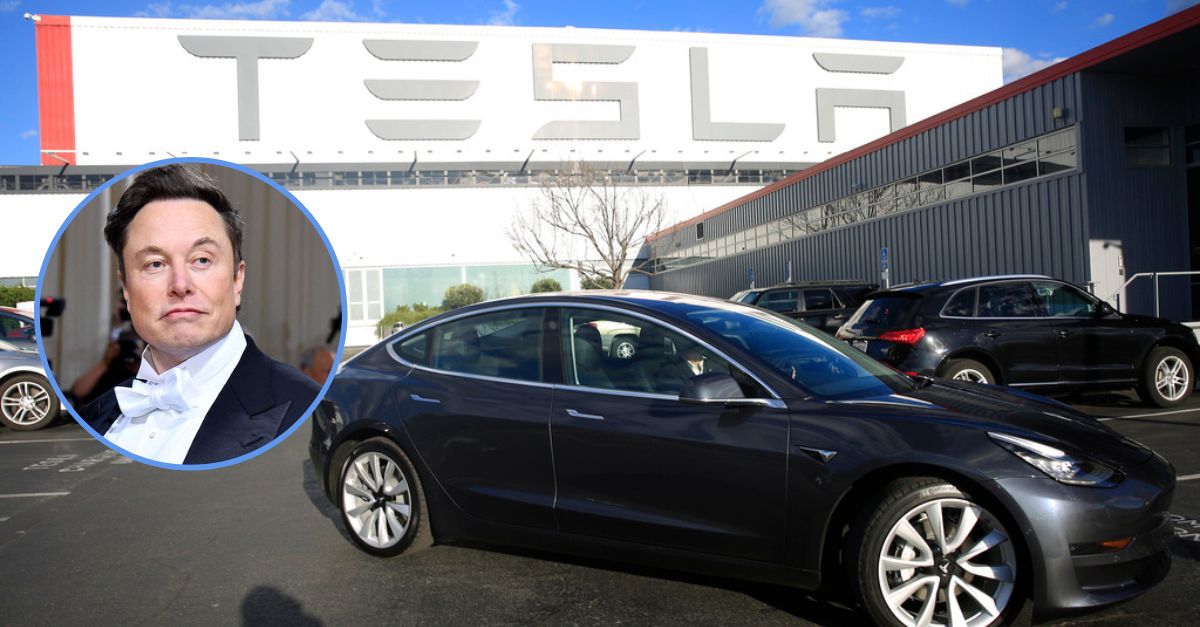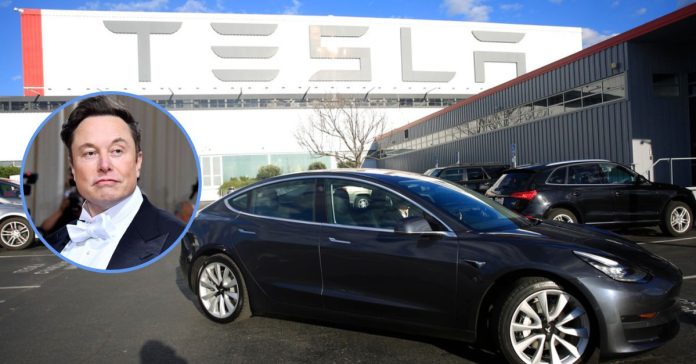
A Tesla Model 3 is seen in Fremont, Calif., on Monday, February 12, 2018. (Lea Suzuki/San Francisco Chronicle via AP). Inset: Elon Musk arrives for the 2022 Met Gala at the Metropolitan Museum of Art on May 2, 2022, in New York (Photo by Dimitrios Kambouris/Getty Images for The Met Museum/Vogue).
A lawsuit alleging that a California Tesla factory is a “hotbed for racist behavior” and management — all the way up to CEO Elon Musk — has done nothing to stop the illegal racial discrimination can proceed, a judge has ruled.
Alameda County Superior Court Judge Noël Wise tentatively ruled on Wednesday that 6,000 current and former Black employees who have worked on the production floor at the factory since Nov. 9, 2016, can proceed with class-action status in a case alleging an intimidating, hostile, and offensive work environment at Tesla’s production facility in Fremont, about 40 miles south of San Francisco.
The $911 billion, 80,000-employee electric carmaker has also been sued by the U.S. Equal Employment Opportunity Commission and the California Department of Fair Employment and Housing over racial harassment and discrimination.
The lawsuit alleges the workers suffered “severe and pervasive harassment” at the Tesla Factory because they are Black. It alleges that despite the repeated attempts to curtail the harassment by reporting it to supervisors, human resources and Musk, the CEO himself, nothing was done to correct it.
The lawsuit was filed after Marcus Vaughn — a former general assembly associate fired after filing complaints internally about daily racist comments and behavior toward Black workers — filed a charge of discrimination with the California Department of Fair Employment and Housing on Nov. 9, 2017. The agency issued a right-to-sue notice that day.
“Although Tesla stands out as a groundbreaking company at the forefront of the electric car revolution, its standard operating procedure at the Tesla Factory is pre-Civil Rights Era race discrimination,” court documents said.
Vaughn reported employees and supervisors began targeting him for harassment based on his race shortly after he started working there on April 23, 2017.
He complained in writing to HR and Musk about it on July 21, 2017, noting that when one of his co-workers complained about the harassment, things got worse for the employee even though his supervisor told him to speak up if anything was happening he didn’t like.
“Since that day there has been so much back lash,” Vaughn wrote, court documents said. “From him getting hit in the back of the head with the chair, to him getting called bipolar, sensitive, people say n—- around him just to get a reaction out of him … All I want to happen is for things to really change … I just hope who ever reads this does something about it before someone on my line snaps and someone gets hurt.”
Vaughn’s complaint was not investigated. Instead, he was terminated on Oct. 31, 2017, for “not having a positive attitude,” the lawsuit said.
Other Black production floor employees shared Vaughn’s experience. One employee heard supervisors use racial slurs regularly, with the lawsuit noting that “[i]t was part of their everyday conversation.”
Another worker witnessed employees, including Black workers, referring to the Tesla factory as “the Plantation” because Tesla “dehumanizes its Black/African-American employees, i.e., treating them like slaves.”
In addition to Vaughn, four other employees filed lawsuits against Tesla, alleging racial harassment.
When a worker showed cellphone videos of violent racial harassment by an employee and supervisor to HR, Tesla took no action. Other complaints fell on deaf ears, and the harassment continued, court documents said.
The harassment continued even after Tesla’s Vice President of Production, Peter Hochholdinger, emailed factory employees on March 11, 2017, stating that anyone found violating the harassment policy would be subject to discipline up to and including immediate termination, the lawsuit alleges.
The lawsuit noted that, like the promises made by management and HR, Hochholdinger’s statement was an empty promise. Tesla claimed it investigated one worker’s allegations and terminated the harassers, but only after the employee who lodged the complaint filed a lawsuit in March 2017 — over a year-and-a-half after his initial complaint was made. After terminating the harassers, Tesla told them they could reapply to work at the factory after six months, court documents said.
The behavior, the lawsuit said, aligns with the Tesla CEO’s belief as to what “doing the right thing” entails regarding race harassment. In an email to factory workers on May 31, 2017, Musk wrote: “Part of not being a huge jerk is considering how someone might feel who is part of [a] historically less represented group … Sometimes these things happen unintentionally, in which case you should apologize. In fairness, if someone is a jerk to you, but sincerely apologizes, it is important to be thick-skinned and accept that apology.”
“In light of CEO Musk’s message to employees that racist epithets can be directed ‘unintentionally’ and that it is ‘important to be thick-skinned,’ it is not surprising that the Tesla Factory has become a hotbed for racist behavior,” the lawsuit said.
A Tesla spokesperson did not immediately respond to a request for comment from Law&Crime.
The company responded to the allegations in a blog post in November 2017. Titled “Hotbed of Misinformation,” Tesla said it is “absolutely against any form of discrimination, harassment, or unfair treatment of any kind. When we hear complaints, we take them very seriously, investigate thoroughly and, if proven to be true, take immediate action.”
The next hearing in the case is set for Friday.
Have a tip we should know? [email protected]

